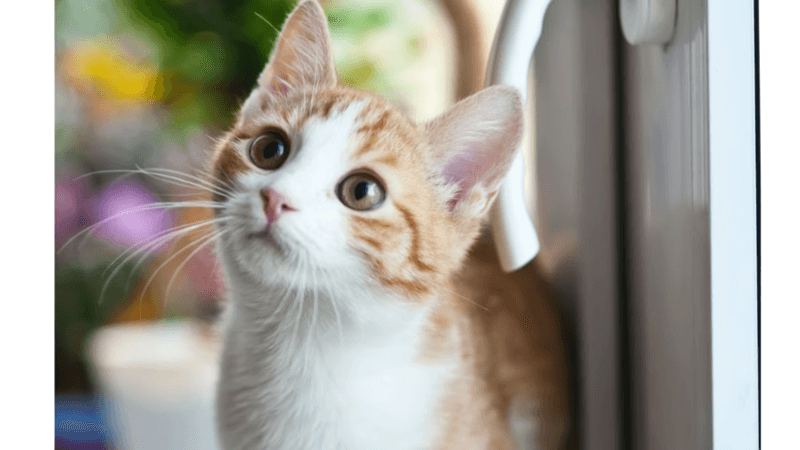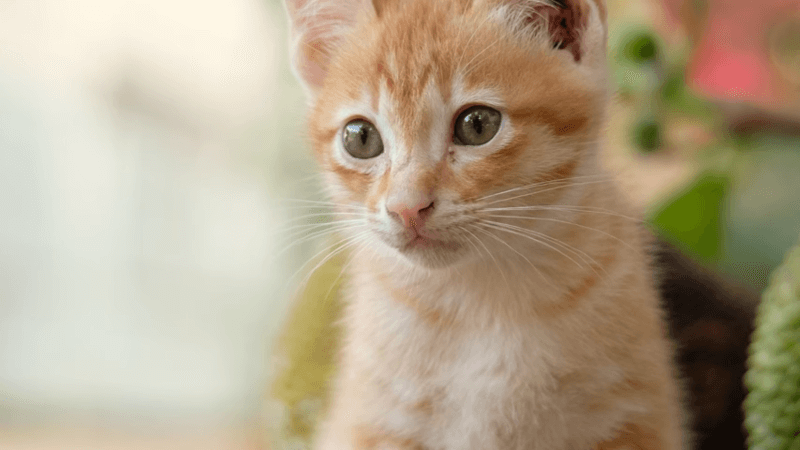No products in the cart.
Just like people can be allergic to certain foods or substances, some cats can also experience allergic reactions to CBD, making them “cat allergic to CBD.” While it’s not very common, these allergies in cats happen when their immune systems react negatively to this specific substance, treating it as if it’s a threat.
In this blog, we will explore the phenomenon of cats being allergic to CBD, its potential causes, symptoms, and how cat allergic to CBD, allergic reaction to CBD in cats, and can I give allergy medicine to my cat.
Cat Allergic to CBD
Just like people can be allergic to certain foods or substances, cats can also have allergies. CBD is no exception. While it’s not very common, some cats may experience allergic reactions when they come into contact with CBD oil cats.
Allergies in cats happen when their immune systems react negatively to a specific substance, treating it as if it’s a threat. So, if you notice any unusual symptoms or behaviors in your cat after giving them CBD, like itching, swelling, or changes in behavior, it’s essential to stop using it and consult with a veterinarian. They can help determine if CBD is the cause and provide guidance on how to manage your cat’s allergies. Your cat’s well-being always comes first!
What Is CBD for Cats?
CBD, or cannabidiol, is a natural thing found in the cannabis plant. Don’t worry, it won’t make your furry friend feel weird or high. People are finding out that it can be pretty helpful for cats, just like it is for us humans.
The CBD for cats usually comes from a kind of cannabis called industrial hemp. This hemp has super low levels of the stuff that makes you high, called THC, so it’s safe for your cat. And guess what? You can give it to them in different ways, like drops, treats, pills, or even creams you rub on their skin. It’s kind of like choosing different flavors of cat food!
CBD Potential Benefits
While research on the specific effects of CBD in cats is ongoing, some potential benefits include.
- Reduced Anxiety: Think about how some people feel a bit anxious from time to time; our cats can experience anxiety too. CBD can help by making them feel more relaxed and at ease. It’s kind of like a cozy blanket of calmness for your cat, especially if they get anxious during thunderstorms or when you’re away.
- Pain Management: Just as we might take pain relievers for our aches and pains, CBD can do the same for cats. It’s like a soothing balm for their discomfort, particularly for cats dealing with chronic pain from things like arthritis or past injuries.
- Anti-Inflammatory: When we have sore muscles or joints, it’s often due to inflammation. CBD has anti-inflammatory powers that can help cats too. Imagine it as a natural way to calm down the swelling, which can be especially helpful for cats with arthritis or skin problems.
- Seizure Control: Imagine the distressing experience of seizures, not just for us but for our cats too. CBD has shown promise in helping to reduce the frequency and intensity of seizures in some cats with epilepsy. It’s like a reassuring hand during a storm, helping to keep things steady.
- Improved Appetite: When we’re not feeling well or recovering from illness, it can be tough to muster up an appetite. The same goes for our cats. CBD can give their appetite a little nudge, making it easier for them to eat and maintain a healthy weight. It’s like a tasty incentive for them to enjoy their meals again.
Is CBD Safe for Cats?
CBD can be safe for cats when administered correctly and with the guidance of a veterinarian. However, there are important considerations to keep in mind:
- Quality Matters: Ensure you’re using high-quality CBD products specifically formulated for cats. Look for reputable brands that provide lab testing results to confirm the product’s purity and potency.
- Correct Dosage: Cats are much smaller than humans, so the CBD dosage should be significantly lower. Always follow the dosing instructions provided by your vet or the product manufacturer.
- Consult with a Vet: Before giving your cat CBD, consult with a veterinarian who has experience with CBD use in animals. They can assess your cat’s unique health condition and provide expert guidance on the right dosage.
- Monitor for Side Effects: Keep a close watch on your cat after administering CBD. While side effects are typically mild and rare, they can include mild drowsiness, changes in appetite, or diarrhea. If you notice any adverse effects, discontinue use and consult your vet.
- Consider Drug Interactions: CBD might interact with other medications your cat is taking. Discuss your cat’s current medications with your vet to ensure there are no harmful interactions.
- Check Legal Status: Verify that using CBD for pets is legal in your area, as CBD laws can vary from place to place.
Allergic Reaction to CBD in Cats
Allergic reactions to CBD in cats occur when the cat’s immune system reacts negatively to CBD, treating it as a harmful substance. These reactions can manifest as a range of symptoms and discomfort for the cat.
- Skin Irritation: Think of it like when we get a rash or redness on our skin when we touch something we’re allergic to. Cats can get itchy and might even have red spots, hives, or a rash from a CBD allergy. It’s not fun and can make them pretty uncomfortable.
- Excessive Itching: Cats can’t tell us when something’s bugging them, so when they’re allergic to CBD, they might start scratching or biting themselves a lot. It’s like when you have an annoying itch you can’t stop scratching – for them, it’s because of the allergic reaction.
- Gastrointestinal Upset: Some cats might have tummy troubles because of a CBD allergy. They could throw up, have runny poop, or not want to eat. It’s like their stomachs protesting because it doesn’t like the CBD.
- Swelling: Allergic reactions can make different parts of the body puff up. It’s like when you accidentally bump your head, and it swells a bit – but for cats, it could happen on their face, eyes, lips, or paws. It can range from a little puffiness to more severe swelling.
- Respiratory Symptoms: Now, this is a serious one. In very rare cases, cats with a CBD allergy might have trouble breathing or show signs of breathing distress. This is a super urgent situation, and you should rush to the vet immediately if you see this happening to your cat.
- Behavioral Changes: Imagine how cranky and irritated you’d feel if you were itchy or uncomfortable. Cats can’t talk, so when they’re dealing with an allergic reaction, they might act out by being restless, agitated, or just not themselves.

The Impact of Allergic Reactions on Feline Health
- Skin Issues: Cats may itch, scratch, and develop redness, swelling, and rashes, risking skin infections.
- Digestive Upset: Allergies can upset a cat’s stomach, causing vomiting, diarrhea, and appetite loss, potentially leading to dehydration.
- Respiratory Troubles: Cats may sneeze, cough, or struggle to breathe due to allergies.
- Ear Infections: Allergic reactions can affect a cat’s ears, causing discomfort and requiring special care.
- Behavioral Changes: Allergies can make cats irritable, anxious, or alter their behavior.
- Secondary Infections: Excessive scratching from allergies can lead to skin sores that may become infected.
- Weight Loss: Digestive disturbances can result in weight loss and malnutrition in cats
Side Effect of CBD in Cats
CBD is generally considered safe for cats when administered correctly and in appropriate doses. However, like any substance, it can have side effects in some cats.
- Sedation or Drowsiness: Just like how some people might feel relaxed or sleepy after taking CBD, some cats may become a bit drowsy. It’s usually a mild effect and can even be beneficial in situations where your cat needs to be calmer.
- Changes in Appetite: CBD can sometimes impact your cat’s appetite. They might eat more or less than usual. Keep an eye on their eating habits, and if you notice a significant change, consult your vet.
- Gastrointestinal Upset: Although rare, CBD can lead to upset stomach or diarrhea in some cats. If your cat experiences persistent digestive issues, it’s best to discontinue CBD and reach out to your veterinarian.
- Dry Mouth: CBD may cause dry mouth, but this is less common in cats compared to humans.
Can I Give Allergy Medicine to My Cat
Yes, you can give allergy medicine to your cat, but it’s crucial to do so under the guidance of a veterinarian. Allergies in cats can manifest in various ways, including skin allergies, food allergies, and environmental allergies like pollen or dust mites. Your veterinarian can determine the cause of the allergy and recommend an appropriate treatment plan, which may include antihistamines, steroids, or other medications designed to alleviate allergy symptoms.

Treatment Options for Cats With a CBD Allergy
If your cat is suspected of having an allergy to CBD, it’s advisable to consult with a veterinarian for guidance. Treatment options for CBD allergies in cats may include.
- Pause CBD Use: Stop giving your cat CBD immediately to eliminate the potential allergen.
- Seek Relief: Consult your vet for options to alleviate your cat’s discomfort, like treatments to relieve itchiness and inflammation, similar to how we take antihistamines for allergies.
- Explore Alternatives: Every cat is unique; your vet may suggest alternative solutions to keep your feline friend healthy, just as we adjust diets and routines to stay well.
- Skin Care: For skin irritations resulting from allergies, your vet may recommend a specialized cream, like ointments we use for our own rashes.
- Stronger Medication: In severe cases, when allergies cause significant distress, your vet might prescribe stronger medications, akin to how we receive potent treatments for severe health issues.
Tips and Strategies to Minimize the Risk of Allergies
- Consult Your Veterinarian: Seek your vet’s guidance for introducing CBD or any new product to your cat, ensuring safety and proper dosages.
- Choose High-Quality CBD: Opt for reputable CBD products designed for cats, with third-party testing to confirm quality and purity.
- Start Low and Gradual: Begin with a low CBD dose and adjust cautiously while closely observing your cat’s well-being.
- Watch for Allergic Reactions: Keep a close eye on your cat after introducing CBD, looking for signs of allergies or adverse effects.
- Maintain a Clean Environment: Regularly clean your cat’s living area to minimize allergen exposure.
- Vet Checkups: Schedule routine vet checkups to catch potential allergies early and receive expert advice.
- Food Allergies: Collaborate with your vet to identify and eliminate allergenic foods from your cat’s diet, considering hypoallergenic options if needed.
Conclusion
While CBD can offer potential health benefits for cats, it’s crucial for cat owners to be aware of the possibility of allergic reactions, commonly known as “cat allergic to CBD.” Cats, like humans, can have individual sensitivities, and observing any adverse symptoms or behavioral changes when introducing CBD is essential.
I am Nelson Cooper, I pursue my passion for writing and my belief is that cats love humans. I enjoy traveling and have a deep appreciation for the beauty of nature, as well as a soft spot for animals, particularly cats.




